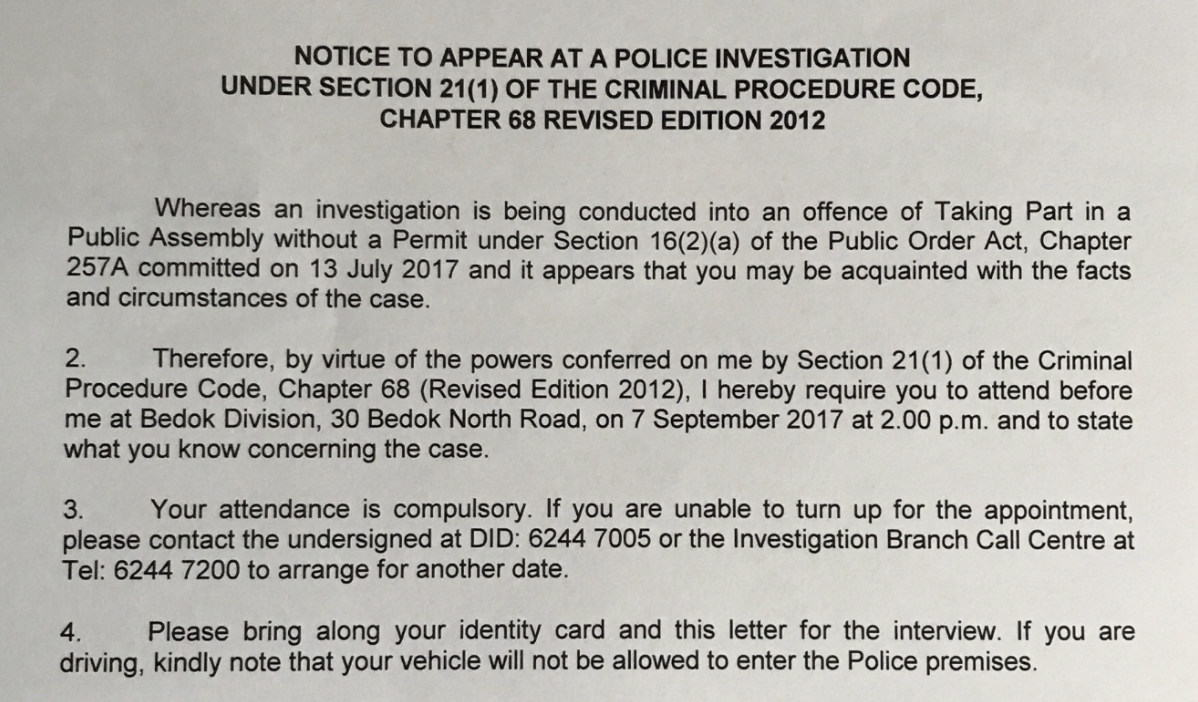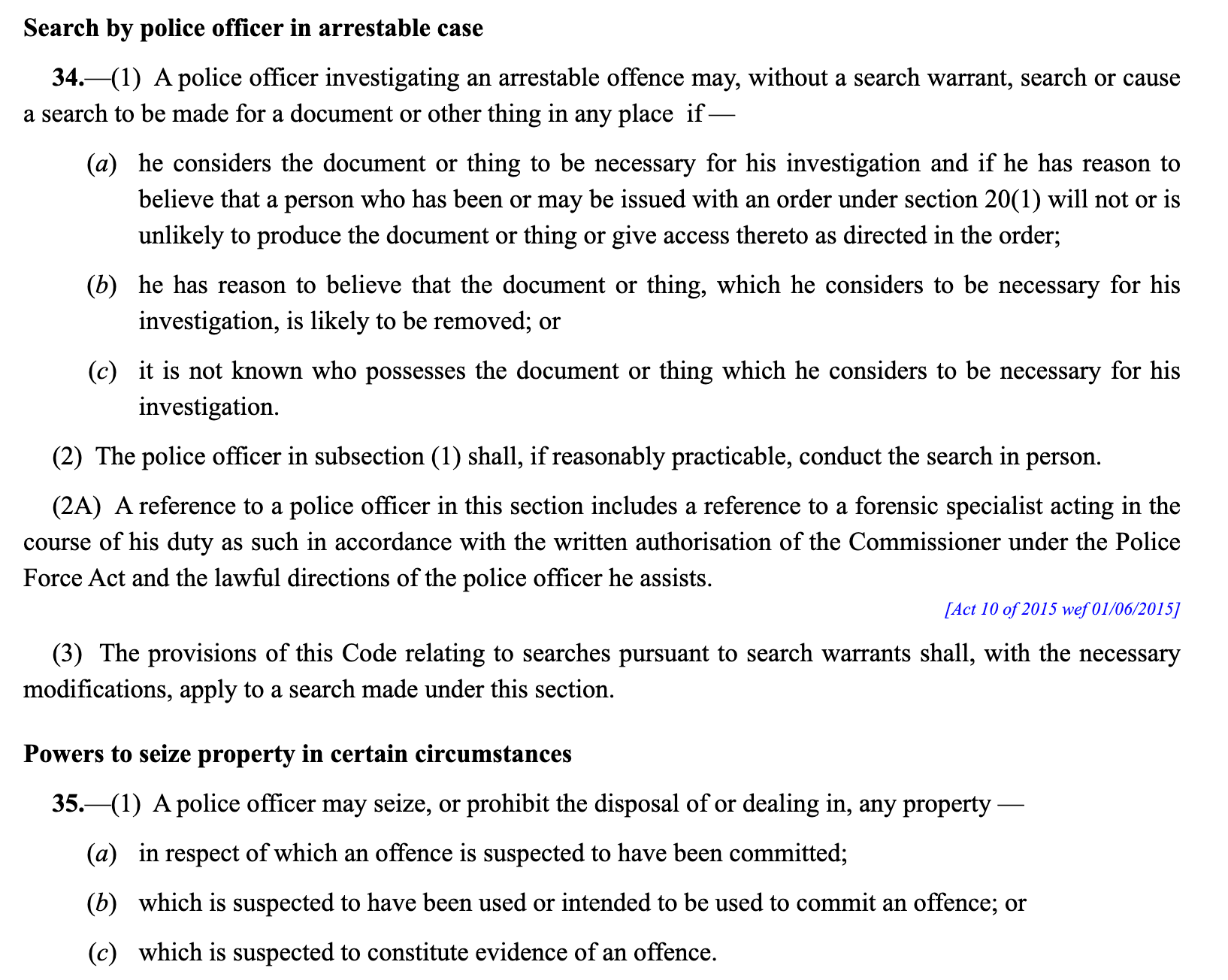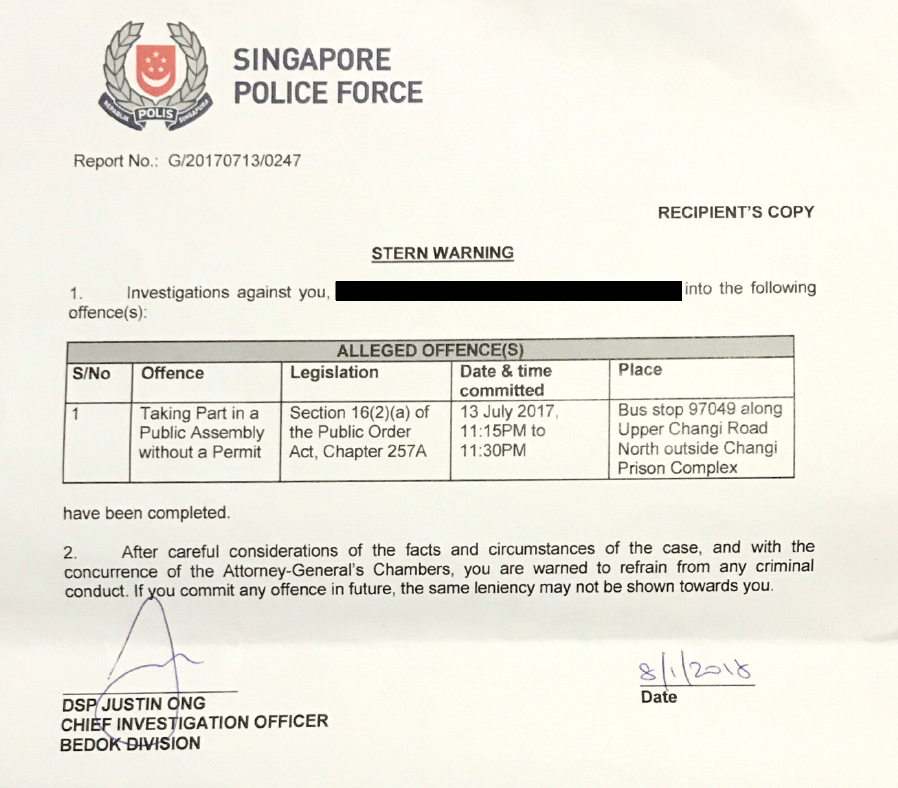I’ve made multiple runs to police stations over the past week to follow up on cases and wait for people to be released from interrogation. While I’ve been mulling over writing up something about the experience of getting investigated for some time, recent incidents have made it seem more timely and necessary than ever to put something out there about this. So in today’s special issue, I’ll be writing about what it’s like to be investigated by the police.
As with last week’s special issue, I have some disclaimers: I’m only writing about investigations into civil society/activism-related activity (so this isn’t meant to be a comprehensive view of what happens if someone was suspected of murder or drug trafficking or something). What I’m sharing today is based on my personal experience, as well as the experiences of people whose cases I’ve followed and/or reported on. I would like to note up front that none of the cases I’ve followed that fed into the writing of this issue involved activity that caused harm or disrupted public order—the “offending” activities have for the most part involved things like posting on social media, or participating in solo/silent/peaceful protests, or events that were later deemed illegal assemblies.
Also, very importantly, this doesn’t replace legal advice—if you get caught in a situation like this and want to talk to a lawyer, please do.
Getting called up
It was a long weekend when two police officers showed up at my door in September 2017. They presented me with a letter telling me to present myself at a particular police station at a particular time to be questioned as part of an investigation into an offence under the Public Order Act. It had to do with a vigil I’d participated in outside of Changi Prison in July 2017, the night before a death row inmate was hanged. (Why they only called me up for questioning two months later, I don’t know.)

At this stage, this isn’t an arrest. It’s merely a request to assist with an investigation (i.e. go for questioning). It’s therefore possible to postpone the interrogation.
I rescheduled my session because I had work, and also because I thought it’d be better to have some time to prepare myself—it’s not every day that you get called in by the police, and for many people just this alone could be intimidating.
Some others aren’t quite as lucky, and the revelation that one’s under investigation could be less gentle. Terry Xu, for instance, has experienced the police showing up unannounced at his place to seize his property (usually digital devices like computers or phones) more than once.
If you’re wondering how the police can just show up and seize things without warrant, that’s because quite a number of offences in Singapore are deemed arrestable, which means that the police can make arrests without warrant. It also means that searches and seizures can be conducted without warrant, as stated in the Criminal Procedure Code:

The First Schedule of the Criminal Procedure Code lists the offences under the Code that are arrestable. Specific legislation will also indicate if specific offences are arrestable—for example, Section 40 of the Public Order Act states: “Any police officer may arrest without warrant any person offending in his view against any of the provisions of this Act, and take him before a Magistrate’s Court to be dealt with according to law.”
Heading to the police station
In 2016, the police called up blogger Roy Ngerng and former political detainee Teo Soh Lung for questioning. The Elections Department had apparently filed reports against them claiming that they had breached Cooling Off Day rules during the Bukit Batok by-election.
The two presented themselves at the police station, expecting short interviews that would be more annoying than frightening. What instead transpired was hours of questioning, and police officers heading to their homes to search and seize their electronic devices.
I remember that coming as a bit of a shock to our little civil society circle. It kicked us into coming up with a system to deal with such events—while people were already supporting each other in the event of investigations or arrests, this time things got a bit more organised.
Here are some basic guidelines that have been adopted since then:
- No one should go to the police station alone. Have someone go with you and wait for you. Given the fact that an interrogation could unexpectedly go on for hours, it’s a good idea to get a few people together so that there’s company while waiting, or work out a rotation so people can take turns.
- Leave the name and contact number (if possible) of your investigating officer with the person/people who are waiting for you. It’s also good to give them your home address and IC number, just in case.
- The person/people waiting for you will also keep track of how long you’re in there. If it gets too long—over two hours, for instance—they can try to contact the investigating officer, or get the reception desk to contact the department/officer to ask what’s going on. It’s mostly to make sure that you don’t go to the police station alone and then have no one hear anything from you for ages, without anyone knowing what’s happened. It’s also to indicate to the authorities that there are people paying attention to and tracking the case.
- Decide ahead of time and inform people about what you’re comfortable with: do you want them to contact your family (if they don’t already know about this)? Are you okay with what’s happening being made public? If you’re okay with it being made public, your friends could post on social media about the case, and raise the issue if you’ve been in there for too long.
- Bring a notebook and a pen/pencil. Because the police won’t give you a copy of your statement (and you won’t get to have a lawyer with you either), it’s best to write down, as much as possible, everything that’s said. Not everyone I know has done this—and there have been some cases in which the police claimed that taking notes was not allowed and stopped them—but I did this during my interrogation and found it helpful.
- Be aware of data privacy and device hygiene, particularly if there’s sensitive or confidential information on your laptop or phone. It’s not just about you, but also people you work and communicate with. Recently, human rights lawyer M Ravi had to put the police on notice that the contents of his laptop and phone are subject to legal professional privilege, after they showed up at his office early in the morning and seized his devices in relation to an investigation into an alleged contempt of court offence. You could also consider using end-to-end encrypted chat apps like Signal or Wire with timed messages. You might want to back up your data too—in case your phone or laptop is seized, you might need that back up to continue with your work.
- Find out as much as possible about what rights you have, and what the procedure should be. (This is where other members of civil society can help you, by sharing their own experiences and advice.) This is really important, because it can help with nerves and anxiety. It places you on more solid footing in your interaction with the police, because you have a better idea of what they can or can’t do. If in doubt about something they’re asking you to do, ask them to show you the law (specific part in specific legislation) that allows them to do that thing. You might not get a satisfactory answer, but remember that you’re entitled to ask questions!
The “interview”
The term that the police use for interrogations is “interview”—it sounds a lot friendlier.
Following that notice in September 2017, I was eventually questioned for about two hours. It doesn’t sound like a particularly long amount of time… but then you have to consider that the offence they were investigating me for was for being part of an “illegal assembly” for 15 minutes (see my warning letter below).
My own experience with interrogation was fairly mundane: it was one police officer and I in a small room and a dripping aircon unit (he was quite apologetic about that). He had a laptop with questions already written on Microsoft Word (if I remember correctly). He typed in my answers as we spoke—there was no recording of the session, since Singapore doesn’t require statements to be verbatim. We went through the list of over 70 questions, many of which were very simple, asking me how I went to the vigil (Uber), why I went (to commemorate the life of the inmate), what happened at the vigil (we sat around and talked).
Some others have had different experiences—I’ve heard friends report that their investigating officers weren’t as friendly as mine. Others were kept for hours, sometimes asked questions, then left alone for a bit, then asked more questions. I’ve also seen cases where the individual was let out for lunch, but had to report back for further questioning after. There have also been cases where more than one officer was in the room, which was seen as more intimidating. But I haven’t heard any complaints of abuse or violence from any of the activists.
One thing to note: under Singapore law, there’s privilege against self-incrimination, which means that you don’t have to say anything to the authorities that might incriminate yourself. (The police won’t inform you of this before they question you.) But this doesn’t mean that there’s a right to remain silent—it’s pretty complicated, but you can read more about it here.
After questioning, the police officer is meant to read your statement(s) back to you. At this point, you’re entitled to make any changes that you want. It’s important to make sure that everything is precisely how you’d want it to be read, down to grammar and syntax—basically, assume that this is something that could be pored over by lawyers in court, so you want it to be as exact as you can possibly get it. In my case, the officer printed out the document and went over it with me; he struck out stuff with a pen and ruler, and wrote in my changes as we went. For example, I requested that all American spelling be changed to British spelling, and that was changed for me.
Once the statement is read back to you and changes made, you’re then supposed to sign the statement. As we’ve seen from Jolovan Wham’s case, refusing to sign the statement is an offence that you could be charged with.
What happens next?
After your questioning, the ball is really in the police’s court. Sometimes they call people back for further “interviews”. Other times—like in my case—you just don’t hear much from them for months until they come to some conclusion. It was only in December 2017, for example, that I was told that the case had been closed; because I was abroad at the time, I only received my warning letter from the police in January 2018.

According to the courts, a warning is merely an opinion of the police and isn’t a “legally binding pronouncement of guilt or finding of fact”. There are different types of warnings: a stern warning (without conditions), or a conditional warning. Singapore Legal Advice has a guide to the difference between the two.
Many of the activists’ cases that I’ve followed have ended with stern or conditional warnings: that was the case with most of us at the vigil, as well as most of the participants of the silent protest on the MRT. Basically, in both those cases, only Jolovan Wham was eventually charged.
Ultimately, being investigated by the police in Singapore for activism or advocacy-related activity isn’t as dangerous or threatening as it might be in many other countries where members of civil society are regularly arrested, jailed, harassed, or even killed. And many of these investigations haven’t actually resulted in arrests, charges, or convictions.
But the investigation in and of itself can be enough. It can be enough to discourage and disempower the individual. It can deter others. It can freak friends and family out, so much so that they start leaning on you to stop (the line between care and oppression can become depressingly thin in such cases). It takes up your time, your energy, your headspace. And if your property has been seized, it disrupts your work, and requires you to spend significant amounts of money replacing the items (since you might not be getting them back for some time, likely the entire duration of the investigation, which can go for months or even a year).
So what does this mean?
I hope that all this demystifies a little what happens when you read in the press about activists getting investigated in Singapore. I don’t imagine that the majority of the people reading this will ever be in such a situation, but I think it’s useful for people to know what it’s like, because it has to do with our rights in relation to figures of authority in Singapore.
For those who might be thinking of becoming more active in civil society, or starting out in activism, I hope this will be a useful contribution to your considerations. I don’t want to scare anyone away from taking a stand for issues that they care about, but it’s really important that your decisions are as informed as possible. I’ve seen people freak out and have to fight their fear when they end up in situations they hadn’t fully expected when they first took action, and that’s not a good place to be in, for yourself and for your peers.
If, after thinking about it, you do decide that you want to be more active for causes that you care about, just know that while Singapore civil society is small, there will be people who will show solidarity.
And at least now you know one person who’s very experienced at waiting at police stations.

